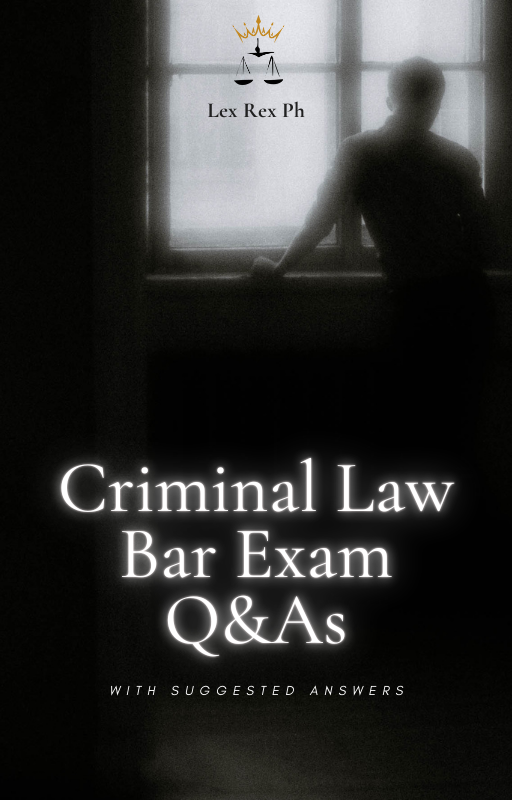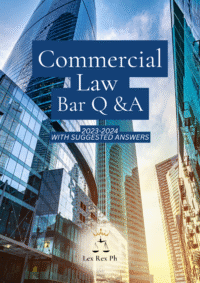Description
Coverage: 2023-2024 only
“Criminal Law Suggested Answers” offers a practical approach to understanding complex criminal law concepts by presenting them within the context of bar exam-style questions. The ebook covers a diverse range of topics, including:
- Extraterritorial Jurisdiction and Crimes Against Humanity/Genocide: It explores the conditions under which Philippine courts can prosecute individuals for crimes committed outside the Philippines, particularly in cases of genocide and crimes against humanity, referencing the Doctrine of Transformation and relevant domestic laws.
- Probation for Minor Drug Offenders: The ebook analyzes the eligibility for probation of a first-time minor offender convicted of illegal sale of dangerous drugs under Republic Act No. 9165, contrasting provisions regarding illegal possession/use with those concerning drug trafficking.
- Complex Crimes (Estafa through Falsification of Public Document): It elucidates the concept of complex crimes, specifically when one crime is a necessary means to commit another, using the example of estafa committed through the falsification of a franchise certificate.
- Impossible Crimes (Theft): The ebook discusses the legal concept of impossible crimes, focusing on factual impossibility due to extraneous circumstances unknown to the offender, illustrated by an attempted theft from an electronic wallet with a zero balance.
- Anti-Violence Against Women and their Children Act (Anti-VAWC) in Homosexual Relationships and Conspiracy: It examines the applicability of RA 9262 to homosexual relationships where the victim is female and the liability of individuals conspiring to inflict psychological violence.
- Criminal Liability in Conspiracy and Aggravating Circumstances (Murder): The ebook addresses the principle of conspiracy in murder, the attribution of aggravating circumstances to co-conspirators (reward and treachery), and the imposition of penalties in light of the prohibition against the death penalty.
- Double Jeopardy in Libel and Cyberlibel: It clarifies that cyberlibel under the Cybercrime Prevention Act is not a new crime but libel under the Revised Penal Code committed through computer systems, thus precluding prosecution for both offenses for the same publication.
- Robbery vs. Theft with Intimidation Using a Toy Gun: The ebook distinguishes between robbery and theft, emphasizing that the use of an imitation firearm can constitute intimidation in robbery under the law.
- Anti-Photo and Video Voyeurism Act and Consent: It differentiates between consent to the recording of sexual acts and the separate written consent required for their publication or distribution under RA 9995
- Withdrawal from Conspiracy in Rape: The ebook explores the liability of co-conspirators in rape, even if one attempts to withdraw, highlighting that a mere advisement to postpone the crime is insufficient to negate liability once the conspiracy is established.
- Self-Defense and Lawful Aggression by a Spouse in Cases of Adultery: It analyzes the elements of self-defense, particularly the requirement of unlawful aggression, and discusses the exception where a spouse pursuing a paramour immediately after discovering infidelity is not considered an unlawful aggressor.
- Qualified Theft and Grave Abuse of Confidence: The ebook explains the qualifying circumstance of grave abuse of confidence in theft, emphasizing that it requires a high degree of personal trust that is gravely abused, beyond merely handling employer’s property.
- Treachery Despite Prior Threats in Murder: It clarifies that treachery, characterized by a sudden and unexpected attack ensuring the execution of the crime without risk to the offender, can still be appreciated even if the victim had prior general warnings.
- Attempted Sale of Dangerous Drugs in Entrapment Operations: The ebook distinguishes between consummated and attempted sale of illegal drugs in the context of buy-bust operations, focusing on the overt acts of the accused.
- Extinction of Criminal Liability in Conspiracy (Anti-Graft Law): It clarifies that the death of a co-conspirator (a public official in this case) does not extinguish the criminal liability of the private individual who conspired with them in violating the Anti-Graft and Corrupt Practices Act.
- Liability for Parricide when Intention was Abortion: The ebook discusses the principle that criminal liability attaches even if the resulting crime differs from the intended one, applying it to a scenario where an intended abortion results in the death of a viable fetus/child, leading to a charge of parricide.
- Number of Rape Counts in Conspiracy: It emphasizes that in a conspiracy to commit rape, all conspirators are liable for each act of rape committed by any member of the group, arising from the shared criminal impulse.
- Robbery with Homicide vs. Separate Crimes of Homicide and Theft: The ebook differentiates between the special complex crime of robbery with homicide and the separate crimes of homicide and theft, based on the offender’s original intent.
- Direct Assault vs. Resistance and Disobedience to a Person in Authority: It distinguishes between direct assault and the lesser offense of resistance/disobedience, focusing on the seriousness of the offender’s actions and intent to defy authority.
- Drafting an Information for Rape in Relation to RA 7610: The ebook provides a sample information for the crime of rape committed against a minor by a live-in partner, incorporating elements of force and intimidation, referencing the Special Protection of Children Against Abuse, Exploitation and Discrimination Act.
This ebook serves as a valuable resource for law students and bar exam candidates seeking to understand and apply fundamental principles of Philippine Criminal Law through illustrative case scenarios and concise explanations.





